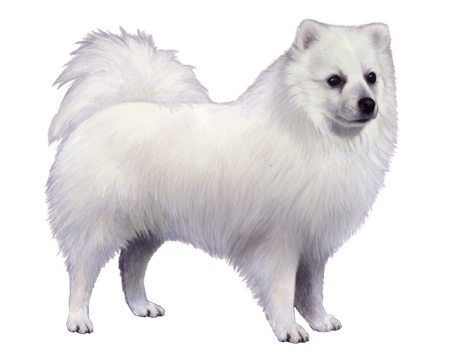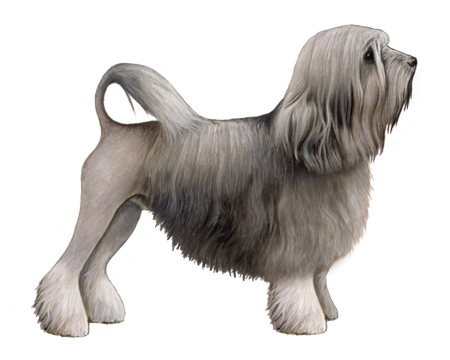
Swedish Elkhound (Jämthund)
Swedish Elkhounds are intelligent, independent, and alert dogs with a reputation of being loyal to family. Traditionally used in hunting, Swedish Elkhounds have a high prey drive, independent nature, and boundless energy. That means the breed needs plenty of room to run and lots of opportunities to do so.
Interested in discovering if your dog is a Swedish Elkhound (Jämthund)?
Check out Wisdom Panel's DNA tests.

Swedish Elkhound (Jämthund) Traits
General Appearance
The Swedish Elkhound has a rectangular body, long and broad head, wide muzzle, and dark, expressive eyes.
Coat and Coloring
The thick double coat of the Swedish Elkhound can be light or dark gray. This breed also often wears a white facial mask and white markings on the body.
Distinctive Physical Traits
A noticeable characteristic of the Swedish Elkhound is a tail that loosely curls over the back.
Swedish Elkhound (Jämthund) Temperament
Swedish Elkhounds were bred to hunt elk and other large game. They can be stubborn and overbearing with other dogs, but they show a calm and affectionate side with their family. Swedish Elkhounds also tend to have harmonious relationships with children due to their protective nature.
A patient breed, the Swedish Elkhound doesn't get annoyed easily, making it a stable companion while on a hunt or at home.


Swedish Elkhound (Jämthund) History
Known as the Jämthund, this Elkhound was named after the Jamtland region in Sweden. An ancient Spitz-type breed, the Swedish Elkhound is larger than many of the other related Elkhound breeds—such as the Norwegian.
Bred initially to hunt big game and serve as a working dog, the Swedish Elkhound was prized for its strength, endurance, and ability to withstand harsh Arctic conditions.
The Swedish Elkhound was recognized as a breed in 1946, moving it out from under the title of Norwegian Elkhound. However, the Northern Breed Group of the United Kennel Club didn't accept it until 2006.
Swedish Elkhound (Jämthund) Care
Nutrition
The Swedish Elkhound requires a high-quality dog food formulated for its medium size and high-energy needs.
Grooming
The Swedish Elkhound's coat is relatively long. Brushing every few days can help remove dead hair and keep it in tip-top condition. Bathing is rarely necessary unless your dog gets into something messy.
Exercise
Swedish Elkhounds are quick, agile dogs. They require regular exercise to stay mentally and physically fit—as most hunting breeds do. The Swedish Elkhound's remarkable stamina allows it to work for long periods in all kinds of weather.
To satisfy their mental and physical stimulation needs, aim to provide moderate to vigorous activity for a half-hour every day. If your pup will be playing outside at home, a fenced-in yard is a must. And if you're out running or hiking together, be sure to use a leash.
Take note that Swedish Elkhounds will likely become quickly bored if kept inside for long periods. And if that happens, they may entertain themselves with destructive behavior.
Training
The Swedish Elkhound is eager to please and generally responds well to training. They love having a job to do and are quick to learn. Reward-based training is most effective.
Early socialization can prevent your Swedish Elkhound from being reactive toward other dogs and overly protective around strangers. And consistent, determined training will help curb natural instincts that may conflict with family life.

Breed Group
Companion
This group consists of dogs typically bred for the specific purpose of human companionship, and many are popular pets because of their gentle nature. They became more common as the concept and luxury of dogs as pets prevailed.
Resources
https://www.ukcdogs.com/swedish-elkhound
https://www.google.com/books/edition/Simon_Schuster_s_Guide_to_Dogs/ewP7tH1eaXMC
Reviewed July 26, 2020 by Annette Louviere, DVM



























_Color.png)





















